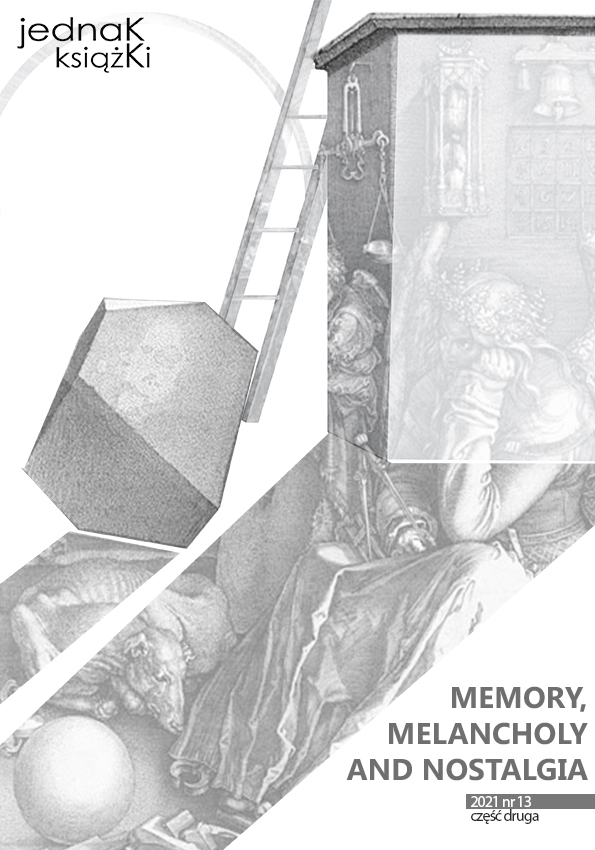Melancholy in Marcel Proust
DOI:
https://doi.org/10.26881/jk.2021.13.03Słowa kluczowe:
melancholy, time, unconscious, involuntary memory, loss, mourningAbstrakt
The purpose of this article is to show how Marcel Proust faces temporality and how we can establish a parallel between his moods and the melancholic state of mind. A brief reflection is made on our relationship with time and about melancholy as consequence of our awareness of the passage of time. Focusing on the study of the first chapter of Swann’s Way, the first volume of Proust’s work In Search of Lost Time, it is presented as part of Proust’s melancholic experience, the fact that he articulated different times with the recourse of involuntary memory, one of the main means used by him in the writing of this work. The question of intuitions as thrusters of this same involuntary memory is addressed and as Proust, neither offering us a figurative literature, nor an abstract literature, used this formula in the struggle against his melancholic hopelessness. It is specified how Proust made the image (figure) to appear alternating the sensation of present with the sensation of past. Some considerations are made about mourning from two different standpoints, firstly from Walter Benjamin’s point of view and his philosophical perspective on the phenomenon of melancholy, then from the approach of Sigmund Freud, to whom melancholy is a pathology within the scope of psychiatry, opposed to mourning. The “loss” prevails throughout this reflection as a condition for the melancholic disposition.
Downloads
Bibliografia
Aristotle. 1957. Problems II, books XXII–XXXVIII. Hett Walter Stanley, trans. London: William Heinemann Ltd.
Baudelaire Charles. 1993. The Flowers of Evil. McGowan James, trans. New York: Oxford University Press.
Benjamin Walter. 2002. Selected Writings, 1: 1913–1926.
Bullock Marcus, Jennings Michael W., eds. Cambridge, Massachusetts: Belknap Press.
Benjamin Walter. 2003. The Origin of German Tragic Drama. Osborne John, trans. New York: Verso.
Benjamin Walter. 2007. Illuminations. Zohn Harry, trans. New York: Schocken Books.
Benjamin Walter. 2016. Ensaios sobre Literatura. Barrento João, trans. Porto: Porto Editora.
Ferber Ilit. 2006. “Melancholy Philosophy: Freud and Benjamin.” E-rea 4.1. Accessed March 1, 2019. Online: http://journals.openedition.org/erea/413.
Freud Sigmund. 1957. Mourning and Melancholia. In: The Standard Edition of the Complete Psychological Works of Sigmund Freud: 1914–1916, 243–258.
Strachey James, trans. London: The Hogarth Press and the Institute of Psycho-Analysis.
Freud Sigmund. 1990. Beyond the Pleasure Principle. Strachey James, trans. New York: W.W. Norton & Company.
Hesiod. 2006. Theogony Works and Days Testimonia. Most Glenn W., trans. Cambridge, Massachusetts: Harvard University Press.
Homer. 2007. The Iliad. Johnston Ian, trans. Virginia: Richer Resources Publications.
Klibansky Raymond, Panofsky Erwin, Saxl Fritz. 1979. Saturn and Melancholy. Liechtenstein: Kraus Reprint.
Pessoa Fernando. 2017. The Book of Disquiet. Costa Margaret Jull, trans. New York: New Directions Publishing Corporation.
Proust Marcel. 1992. Swann’s Way, In Search of Lost Time. Scott Moncrieff Charles Kenneth, Kilmartin Terence, trans. New York: The Modern Library.

 Uniwersyteckie Czasopisma Naukowe
Uniwersyteckie Czasopisma Naukowe





